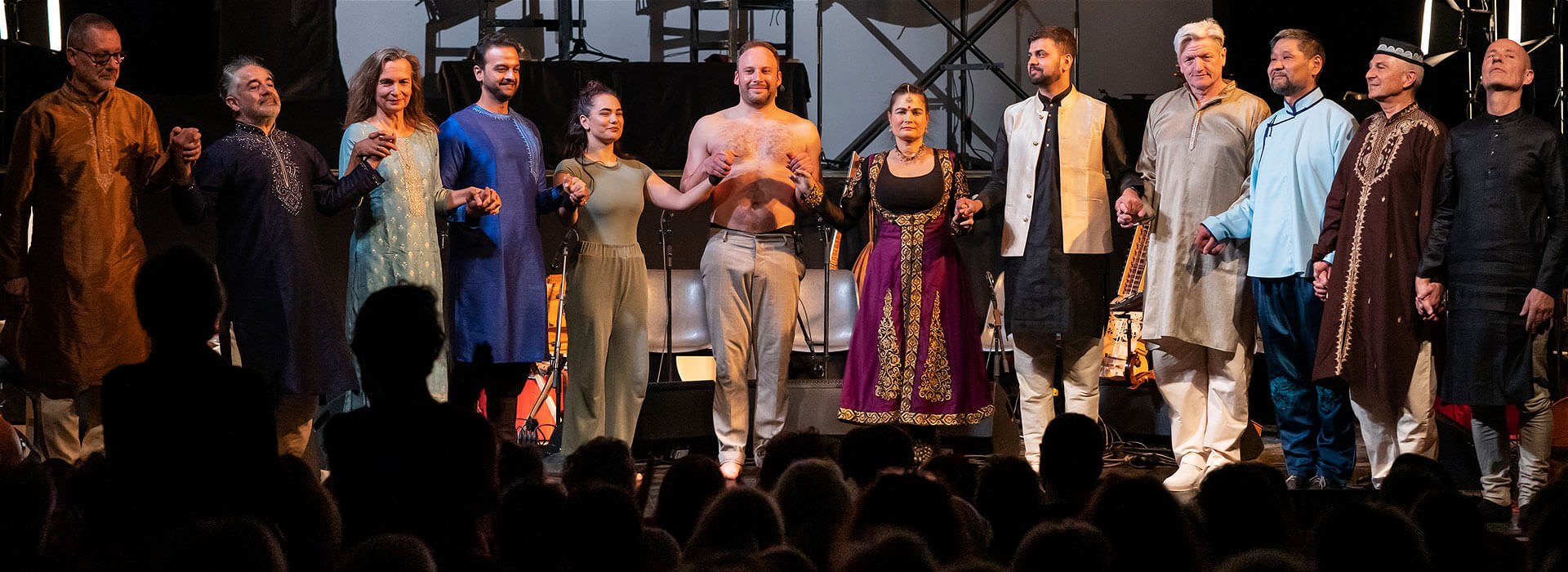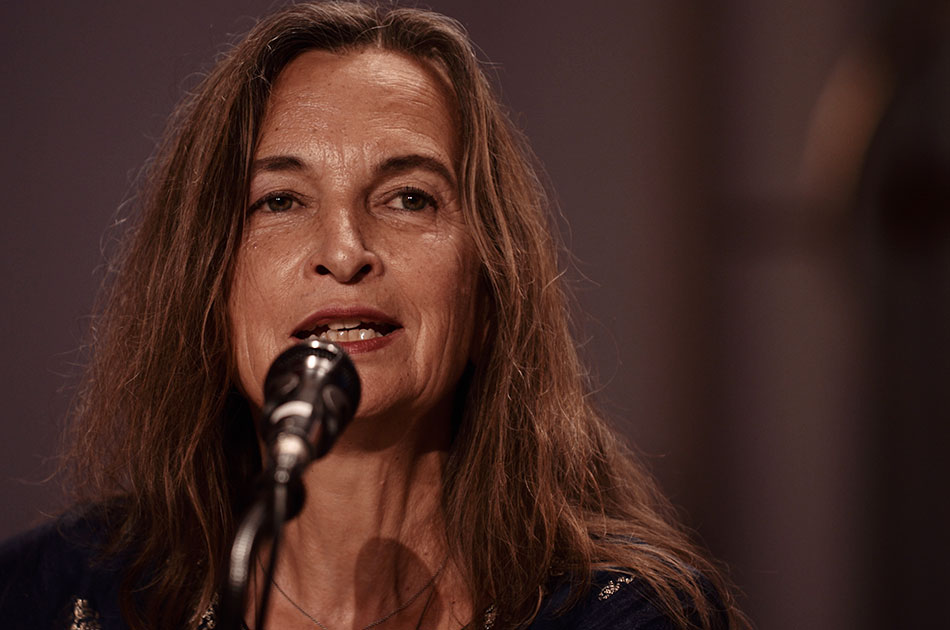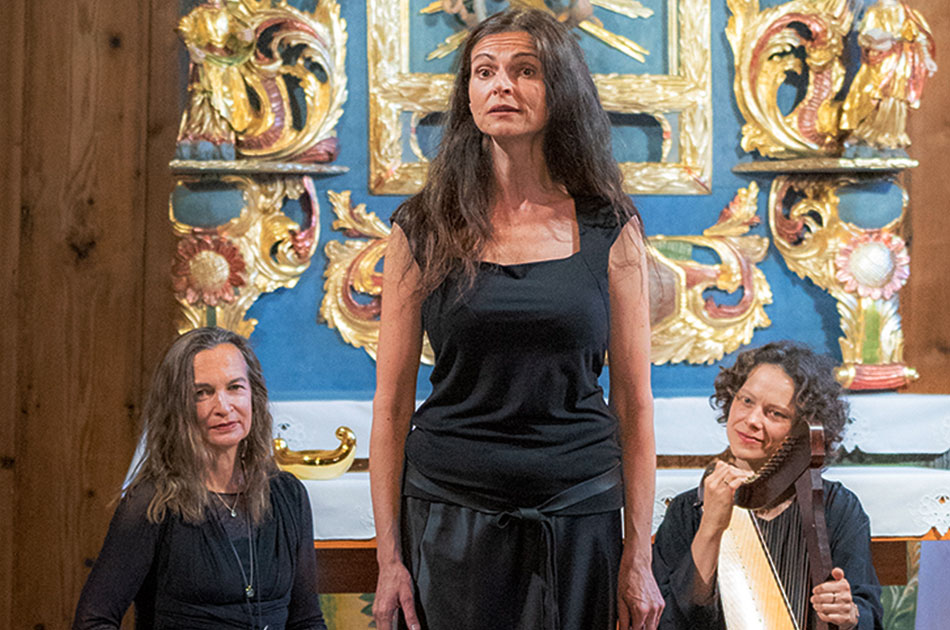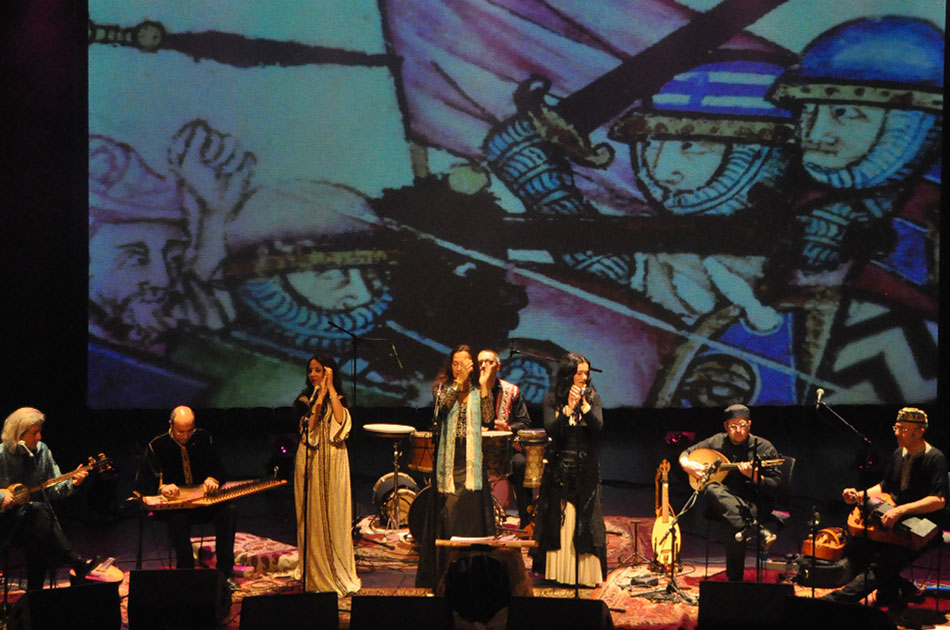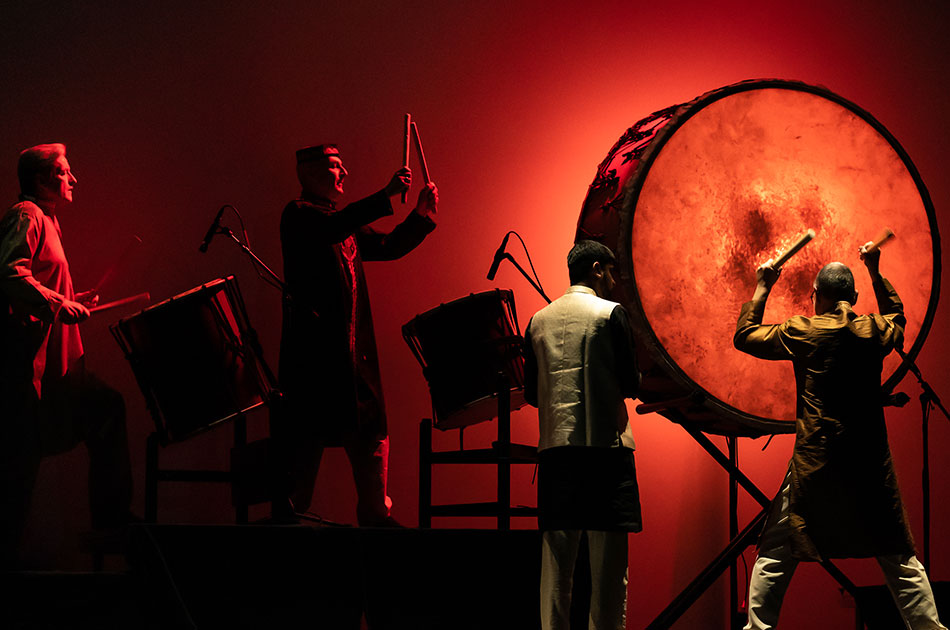„Hear the voice of the bard“
A staged concert centred around the Mahabharata and Parzival with musicians, dancers and actors from India, Mongolia and Europe.
Concerts 2024
Puchheim – PUC
Archive
2023
April 29 – 30 Flandern Festival – Mechelen„Hear the voice of the bard“
Prolog
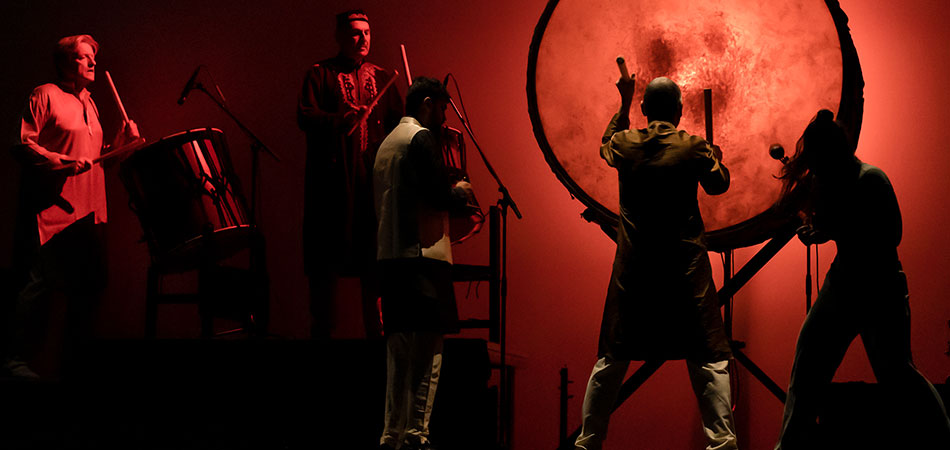
There is fire under the earth and the fire is pure.
It is fire under the earth and liquid stone.
There is a stream under the earth that flows into us.
There is a stream under the earth that scorches the bones.
A great fire is coming,
A river is coming over the earth,
We will be witnesses.
(Ingeborg Bachmann)
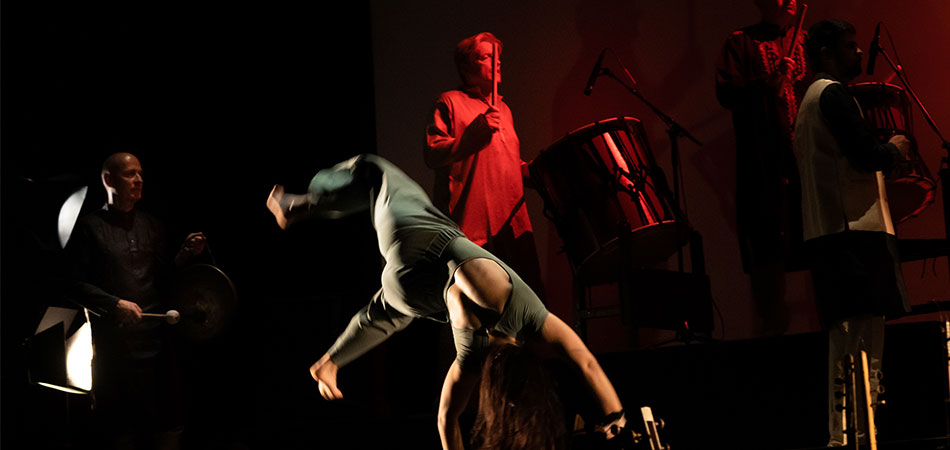
With this text, Ingeborg Bachmann has joined the long line of seers and mystical interpreters of our world, our history and stories. During her lifetime, she was regarded as a strange apologist, a kind of Cassandra, and it is clear that she gave expression to an attitude to life that reaches into the future and thus also into our present, but at the same time describes an almost archaic, ever-present existential need of people in danger. As fate (karma? fate?) would have it, she died at an early age from the late effects of a fire that she had caused herself, smoking in bed, heavily anaesthetised by intensive medication.
The Creation
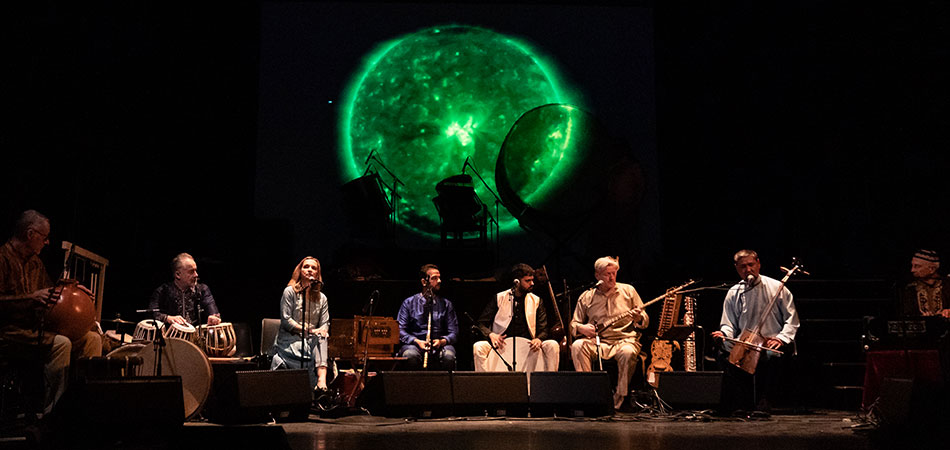
Let me tell you a story about how everything came to be - as an Inuit grandmother told her grandchildren a long time ago: When the earth formed, everything fell down from high above. Rocks, stones and soil, it all fell down from the sky. And out of the soil came little children. They layed under the willow trees with their eyes closed, fidgeting. They couldn't even crawl. And the earth nourished them. Then we heard of a woman and a man. But whence did they come? Mysterious. When did they find each other? How did they grow up? We don't know. But one day the woman sewed children's clothes and went out. She found the little ones, dressed them and brought them home. And so there were many people. They lived in the dark because there was no sun. Only at home did they have some light. And they began to multiply. And they grew old and lived forever because there was no death. And people crowded the earth. One day an old woman said to another: We want to have both, light and death. And when she said that, it happened like this. We need both, light and death. And as she said this, so it came into be. With death came the sun, the moon and the stars. Because when people die, they go high up in the sky and start to shine.
From the many creation stories that exist in different corners of the earth, here is an orally transmitted text from the Inuit culture.
Our forefathers told many stories about the creation of the earth. They could not hide the words in lines as the white men did later. They only told the people who lived at that time. They told of many things. That is why we are not ignorant. Old women don't just talk like that, and we believe them: there are no lies in old age.
Back then, a long, long time ago, when the earth was to be created, it fell from above. Earth, rocks and stones, high down from the sky. And then came the people. Little children came out of the earth, out of willow bushes, and they lay underneath with their eyes closed, wriggling; for they could not even crawl. They got their food from the earth.
The story is told by a man and a woman. But how? That is a mystery. When did they have each other? When did they grow up? It is not known. But the woman sewed children's clothes and went out. She finds the children, dresses them and brings them home. That's how many people became. They didn't know the sun. They lived in the dark. Only in the house did they have light. And the people kept multiplying. And they became very old, because there was no death. And they overcrowded the earth. Then an old woman said to another: "We want both light and death." And when she had said this, it became so. And with death came the sun, the moon and the stars. For when people die, they rise up to heaven and begin to shine.
(Eskimo tale. Cologne: Diederichs 1969)
In ortum mundi sensibilis
Mundus intellegibilis
Coelo simul
et terra condito
De divino
iam prodit animo.
On the rise of the sensual world
Is the spiritual world
As heaven and earth
Created at the same time,
Long since emerged from the divine
Soul emerged.
Tellus inanis, vacua
Latebat aquis obsita,
Ac facies
profundi gurgitis
Caligabat
obductis tenebris.
The earth was hiding,
Desolate and empty, covered by waters,
And the face
of the abysmal whirlpool
Darkened
Over it spread darkness.
Aquae fovens vivificus
Iam incumbebat spiritus,
Ut hinc aquae
iam tunc conciperent,
Unde problem
nunc sacram parerent.
The water incubating, bent down
The spirit, the giver of life, bent down,
Since from there the waters
received even then,
From which they gave birth to the holy brood
now gave birth.
Mundi quoque primordia
Lucis venustans gratia,
Dixit Deus:
Sit lux, et facta est,
A tenebris
inde divisa est.
Even the world's primeval beginnings
Thrilled by the charm of light,
And God said:
Let there be light, and there was,
From the darkness
It has been separated ever since.
The miracles of conception and birth
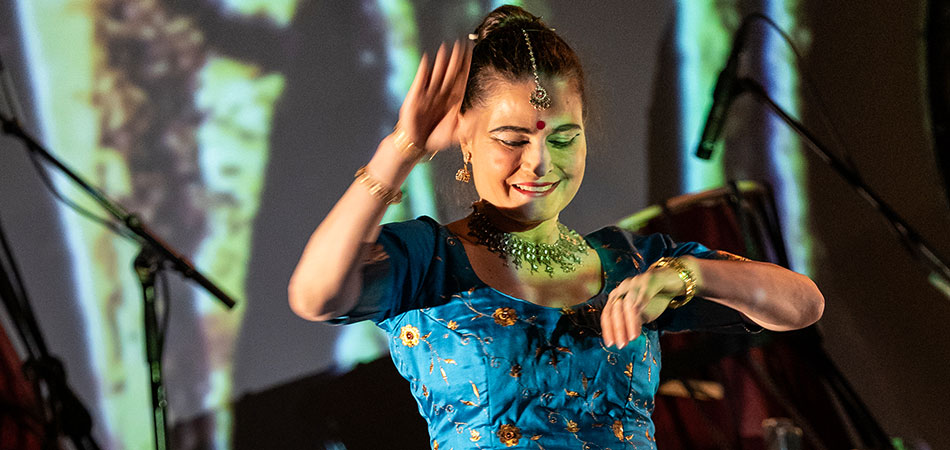
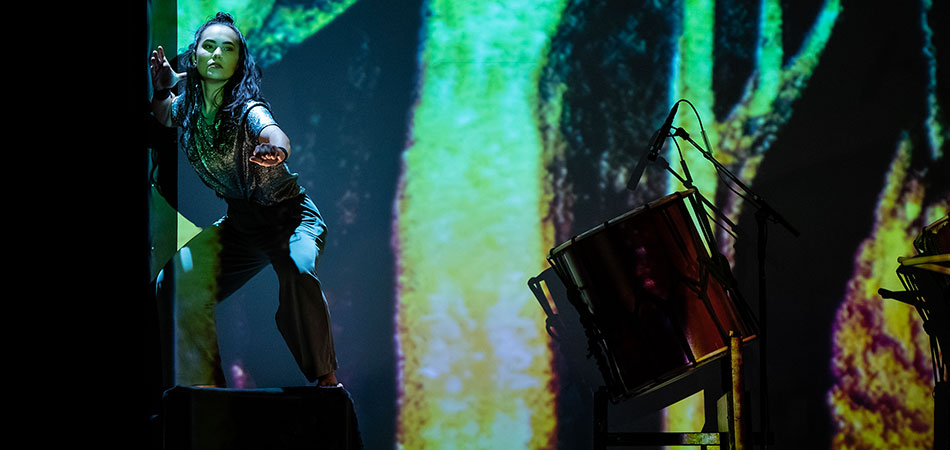
The great Indian epic, the Mahabharata, concerns two royal brothers: The first born blind, the other one pale. The blind king Dhritarashtra took a wife who blindfolded herself for life out of her love for the king. As the foretelling said, she became the mother of a hundred sons, the Kauravas. The brother of the blind king, the pale Pandu, was hunting one day. There he shot an antelope mating with a doe. It was a sage and his wife, who had used their powers to turn themselves into animals to be intimate in the open.
In the throes of death, the sage cursed Pandu: “You, who have so violently stopped me from making love to my wife, may you never know such pleasures! You will die the instant you touch a woman!“
Thereupon Pandu left the palace to live as a hermit as he could no longer father an heir to the throne. After some time his wife Kunti revealed to him the secret of a mantra she had received that would enable her to summon any god and have a child with him. First she called Yama, the god of death and justice. With him she had her first son, Yudhishthira, who would grow up to be the most honest and just claimant to the throne.
Second she called Vayu, the god of the winds. Their son was Bhima, the powerful mace bearer. Then she invoked Indra, the king of the gods and ruler of the sky. With him she had her third son Arjuna, who would become the best archer in the world. And finally, his other wife gave birth to two more sons of divine origin. This is how the Pandavas were born.
Their father had two wives and died childless. To ensure the succession, an uncle who lived in the forest as a saddhu (sage) was brought in. He reluctantly approached the first queen, who covered her eyes during intercourse because of his unkempt appearance. Her child Dritherashtra then went blind. The second widow knew of the fate of the first and dared not close her eyes, but turned pale with disgust and revulsion during intercourse, so that her newborn, Pandu, was pale for the rest of his life.
Dritherashtra later found a wife who loved him so much that she blindfolded herself on their wedding day and never took it off for the rest of her life, thus sharing her husband's blindness. Pandu, on the other hand, lived the life of a pious sage with his two wives in the forest. He was forbidden to touch his wives because of an evil mantra.
The Heroisation
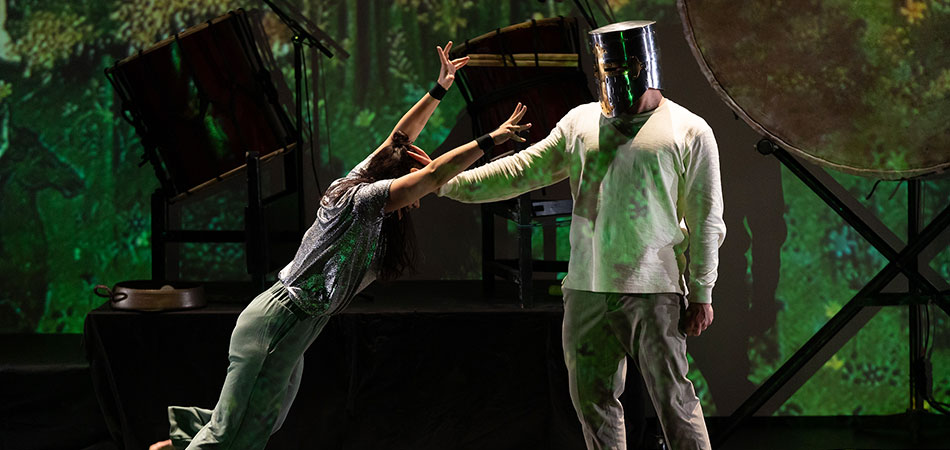
While some revel in producing heroic descendants for more fame and strength of their own lineage, others try to save their only child from the temptations of the world and heroic death. But no mother, no matter how hard she tries, can hide her beloved child from his own fate. “Per ce val“ – “through this valley“ he must go – Parzival.
Parzival did not listen to his mother's words. He wanted to be a knight. Rather, he wanted to have beautiful armor. Little did he know that to take away a knight's armor, he would have to take his life first. This unintentional murder saddened him. But what can you do about something you were born for?
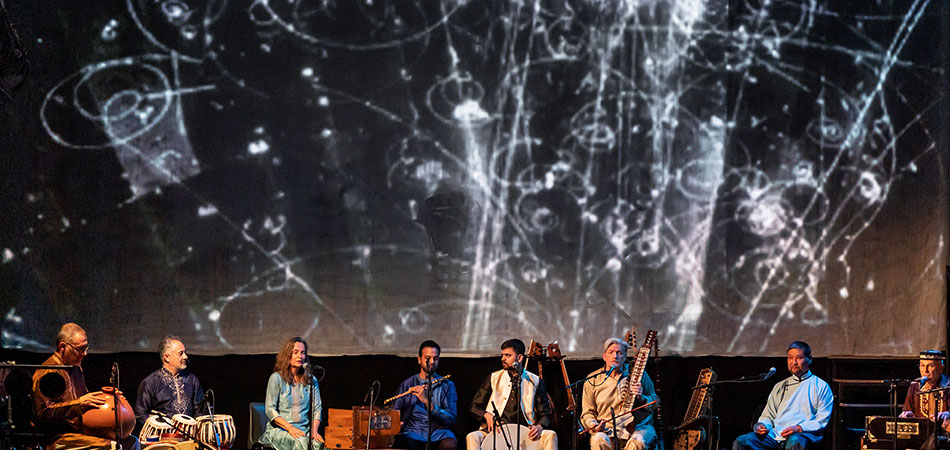
Parzival epitomises heroism and at the same time the fate of all heroes, which is tinged with grief and tragedy. His mother, the widow of a king who died in battle, wanted to save her son from a similar fate and moved into the forest with her female court and her son. Parzival grows up with only women, but despite all his mother Herzeloyde's warnings, he feels the urge for battle and heroic deeds.
One day, when he encounters the red knight Ither in the forest, a battle ensues and a tragic fate full of trials and tribulations takes its course. The reason for the fight is that Parzival asks the Red Knight to give him his armour, unaware that this is against all knightly etiquette.
The psychoanalytical interpretation is that this scene symbolically represents the act of "armour appropriation" in male personality development. The armour is supposed to give the man strength and protection, but if it does not fit, it can constrict and hinder development.
The Water
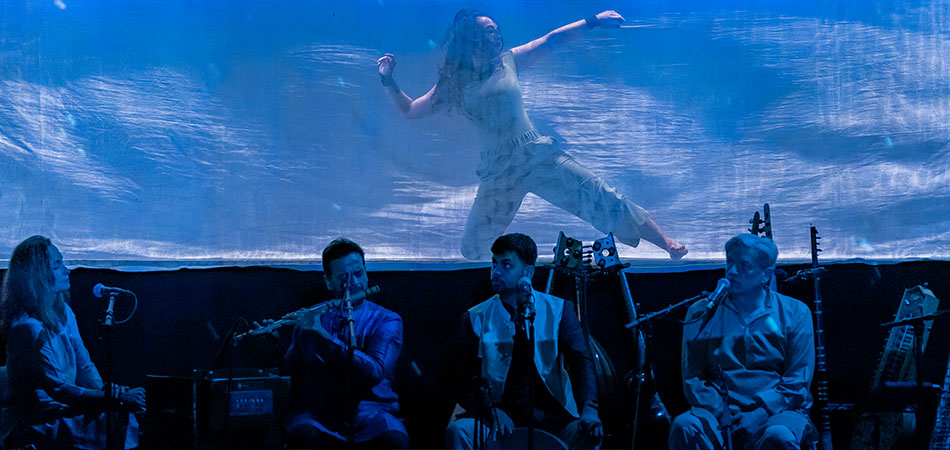
In a material-physical sense, water is the source of all life. We and all life can only exist because there is water on earth. The great legends are also rooted in an era in which water was the natural habitat of mankind. Both in India and in prehistoric times, the Aryan immigrants slowly advanced along the courses of the rivers on the Indian subcontinent. The same was true of the first Neolithic farmers who spread across Europe from what is now Turkey.
It is therefore not surprising that water is also of central importance in mythological, symbolic and deep psychological terms.To become a true hero, even a demigod must walk a long and rocky road. During his childhood, ferocious Bhima, one of the five Pandavas, constantly bullied his cousins, the hundred sons of his blind uncle, picking them up and throwing them down, tossing them bodily around and shaking them out of trees. Tired of his physical supremacy, the angry Kauravas decided to avenge their humiliations. Well aware of his love for food, they invited Bhima to a picnic on the banks of the river Ganga and offered him poisoned sweets. The unsuspecting Bhima ate them, falling unconscious. He was bound and thrown into the water. Bhima sank deeper and deeper. And deeper and deeper he sank.
Until he reached the serpent kingdom, where the snakes came for him. He regained consciousness and was shocked to see himself tied and under attack by serpents. He did not realize that their poison acted as an antidote, and that they also bit his shackles to free him. Upon freeing himself of the snakes one of them told him to follow. The creature led him into a cave where he reached their court, warmly welcomed by the serpent king Vasuki, a friend of Bhima's royal family. The king gave him a potion that made Bhima immune to all kinds of poison and bestowed upon him the strength of a thousand elephants. And so Bhima returned to his family as the strongest of all men.
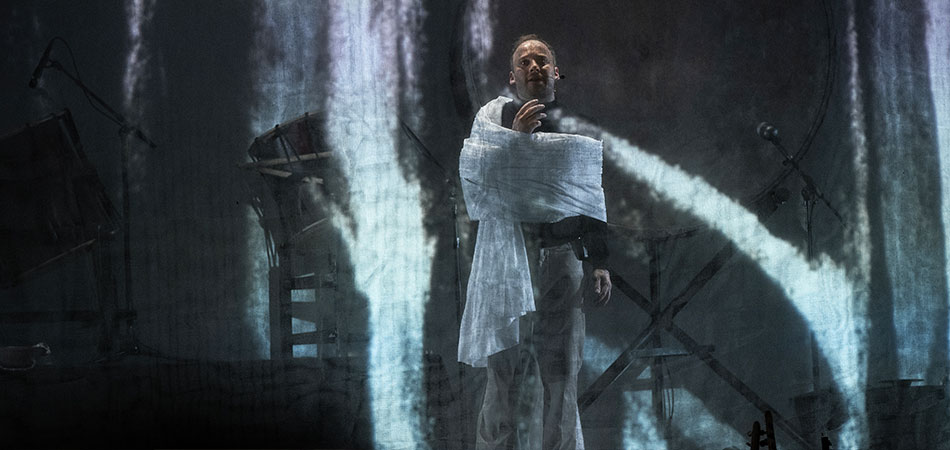
In this picture, we turn back to the Mahabarata: The blind Dritherashtra had had 100 sons who grew up in clay pots: the 100 Kauravas. Pandu, through the fulfilment of a mantra once received by one of his wives, Kunti, had 5 sons, all five heroic demigods.
The second eldest of them, Bhima, was a strong as a bear and could even take on all 100 cousins, the Kauravas, as a child and teenager. They decided to eliminate him, poisoned him insidiously, tied him up and threw him unconscious into a lake. Bhima sank down.
There were deadly poisonous snakes in the lake, which preyed on Bhima. Normally their venom is also deadly, but in this case their venom acted as an antidote to the one the Kauravas gave him. Bhima woke up underwater, defeated all the snakes and finally reached an underwater cave where there was a deity. This deity received and blessed him and gave him the strength of 100 elephants. Bhima emerged and from then on was an unbeatable hero among men.
Music: “Where is the need of words, when love has made drunken my heart”
Text: Kabir, Indian Sufi (1440-1518) translated from Hindi into English
The Forest
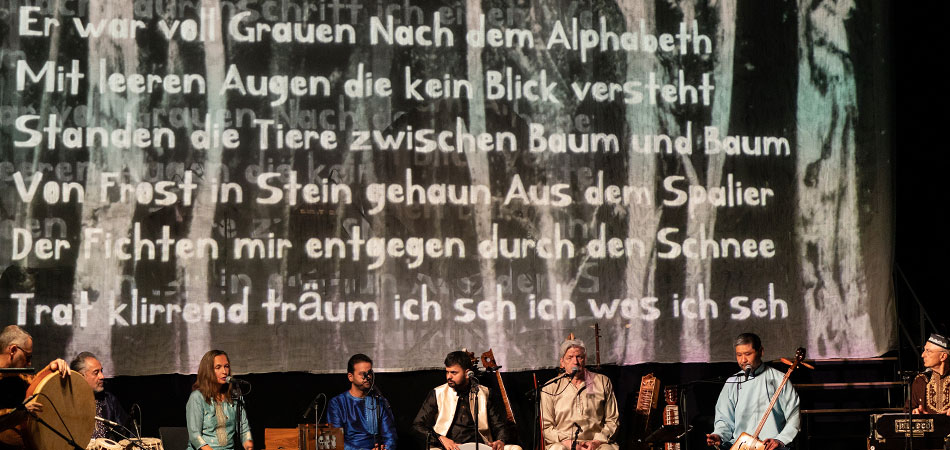
This image is fulfilled by a poem by the great German playwright and poet Heiner Müller, who wrote it shortly before his death in 1995 and which bears the title "Traumwald".
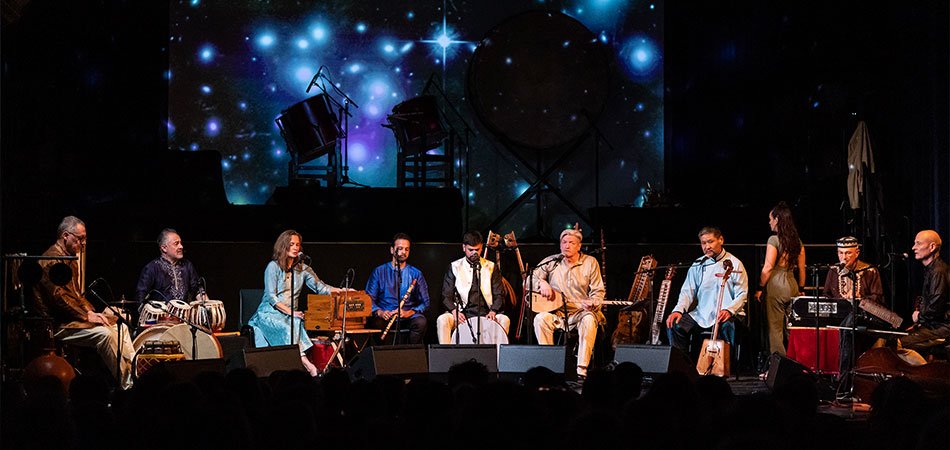
Tonight I walked through a forest in a dream
He was full of horror After the alphabet
With empty eyes that no gaze understands
The animals stood between tree and tree
Carved in stone by frost. From the trellis
The spruces towards me through the snow
Stepped clanking I dream I see what I see
A child in armour and visor
In his arms the lance whose point flashes
In the spruce darkness that drinks the sun
The last trace of day a golden line
Behind the dream forest that beckons to die
And in the blink between thrust and thrust
My face looked at me: the child was me.
Music: “Omnibus ostendo quod homo sum corpus habendo” – Abaelard
The Karma
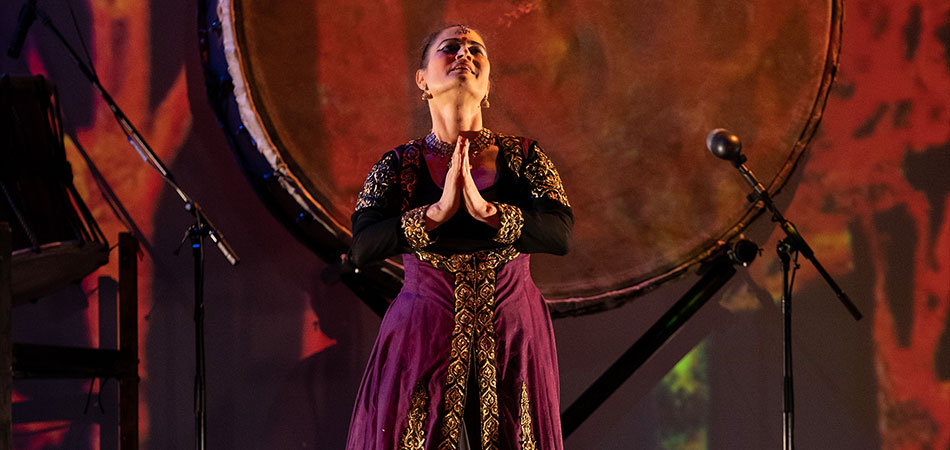
Several episodes from the Mahabarata are told - in the form of the traditional Indian Kathak dance, which show the path from the kinship-based childhood friendship of the two heroic families, through the emergence of rivalry and jealousy, to deadly enmity.
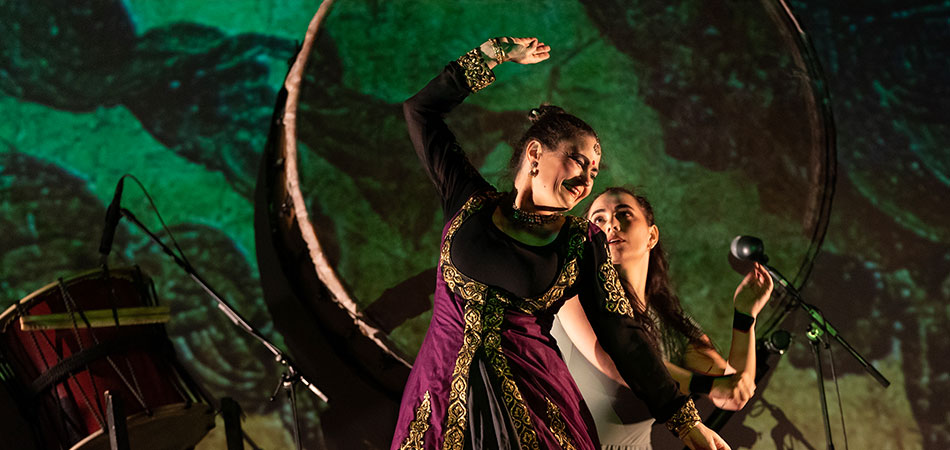
The selected episodes:
The Kauravas invite the eldest of the Pandus, Yogishtira, to a game of dice, who only accepts the invitation for the sake of courtly etiquette and consequently loses everything: the Pandus' entire property and also their common wife, who is subsequently dishonoured by having her sari wrapped around her body in front of everyone. However, divine assistance makes the sari endlessly long so that she never stands unclothed in front of the assembled company.
The pandus have to go into exile in the forest for years because they have lost everything. But when they return, they immediately rebuild a flourishing empire and a magnificent palace. The eldest of the Kauravas comes to visit to enviously scrutinise the wealth of his rivals and clumsily falls into a pool of water whose surface was so smooth that he mistakes it for a marble floor. He is ridiculed by the servants, humiliated and swears revenge. Finally, a decisive battle is fought with the support of the gods.
Epilog
Conversation Arjuna – Krishna
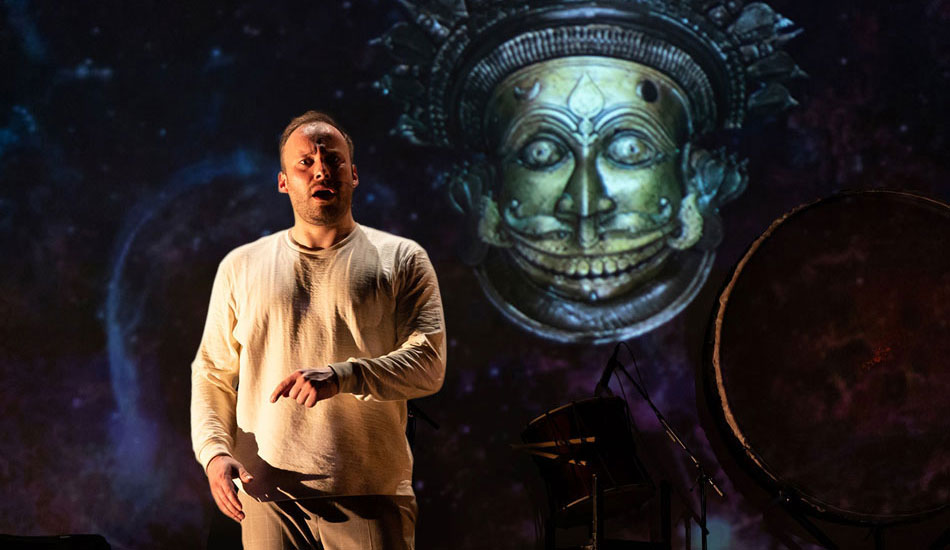
K: I am Krishna, the origin, the middle and also the end of all beings.
A: And... who am i?
K: You are the hero Arjuna, the one with the bow.
A: Where are we?
K: On the battlefield.
A: Who stands over there?
K: The army of the Kauravas, several hundred thousand men.
A: And how many are we?
K: Much less.
A: Fortunately you are on our side, oh Krishna, the invincible!
K: Yes.
A: But where is your army?
K: On the opposing side.
A: Why?
K: I couldn't decide on a side. That's why I fight for you, but my army for the Kauravas.
A: But your army is also invincible! How is this battle supposed to end? That's no fight, it's just attrition, total defeat, the downfall! And these are our relatives over there, this is madness!
Krishna stays silent
K: Who are you?
A: Arjuna, the archer.
K: What are you?
A: A warrior. A good warrior!
K: And what does a warrior do?
A: He fights.
K: So go and fight! Act, but do not attach your heart to your actions. And do not long for the fruits of your actions. For you cannot anticipate their consequences. You shall not discard an action that is in your nature, even if it seems tainted. Because all action is tainted, just as fire is shrouded by smoke.
And don't be afraid of the downfall. For you will be happily united with your brothers and friends, even with your enemies, whom you may have killed.
A: Well, let's go and fight.
It is clear that the battle cannot be won by either side, because the invincible god Krishna is fighting on the side of the Pandus, but his army is on the side of the Kauravas. There is only one survivor, Yogishtira, who is allowed to enter heaven together with a dog he befriended on the battlefield.
ENSEMBLE
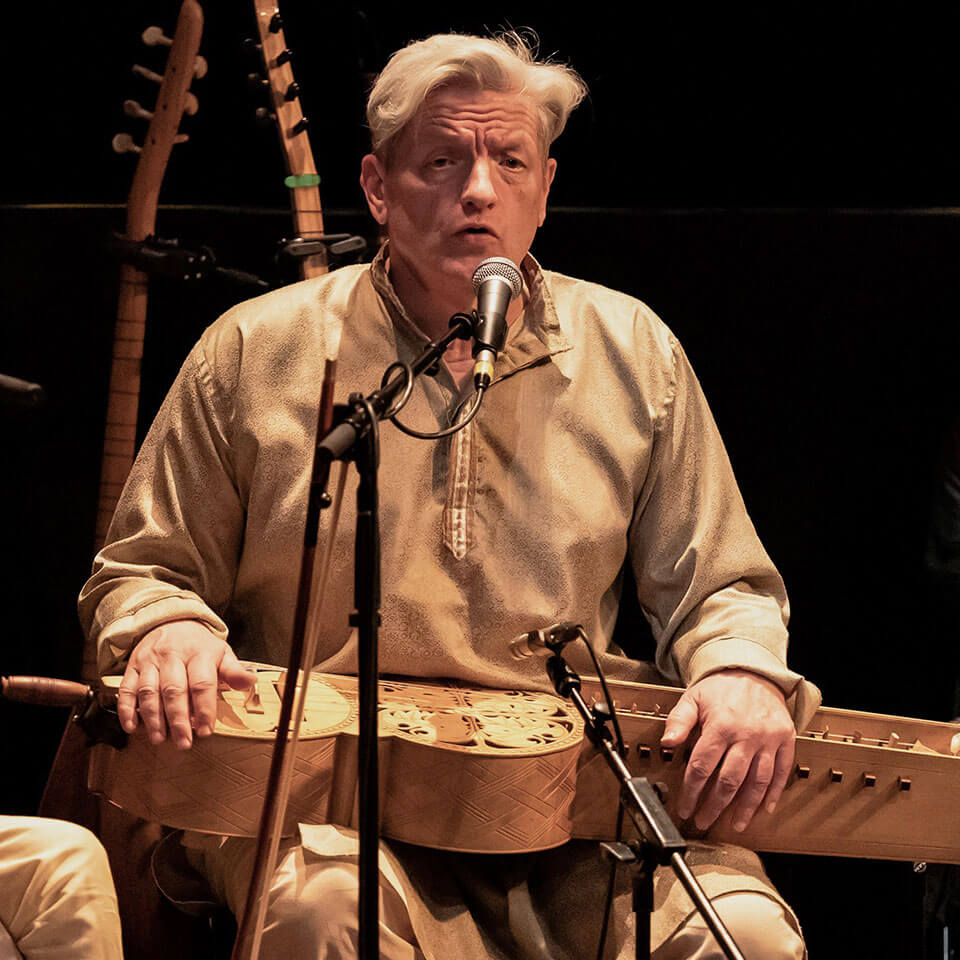
Michael Popp
Fidel, Saz, Bouzouki, Ud, Dilruba, Tar, Organistrum, Lafta, Santur, Vocals
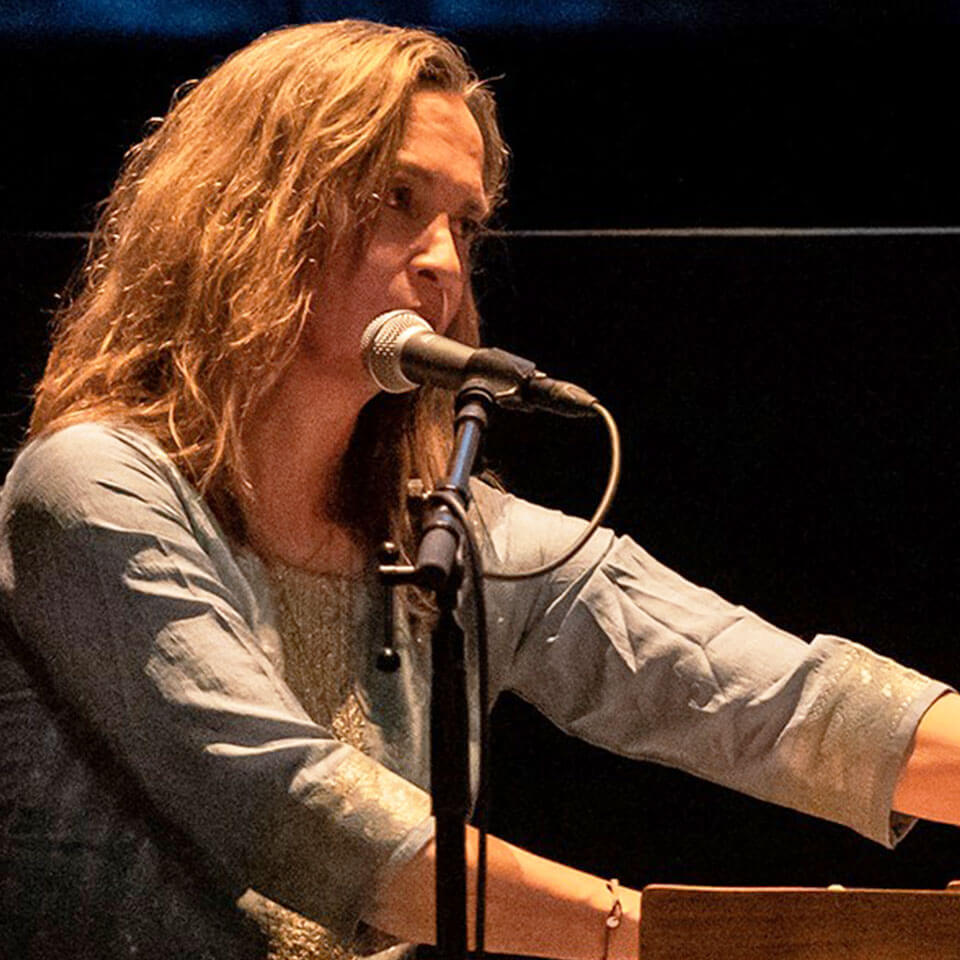
Sigi Hausen
Vocals, Flute, Indian Harmonium
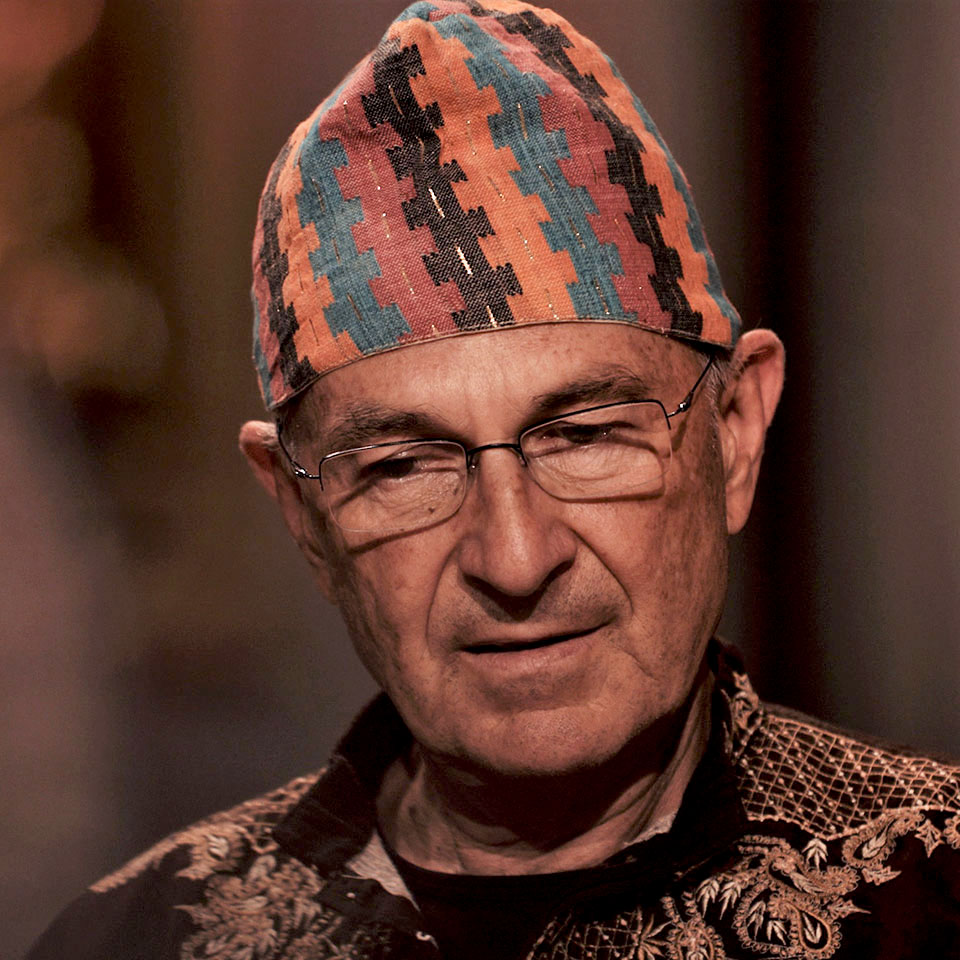
Ernst Schwindl
Hurdy-Gurdy, Indian Harmonium
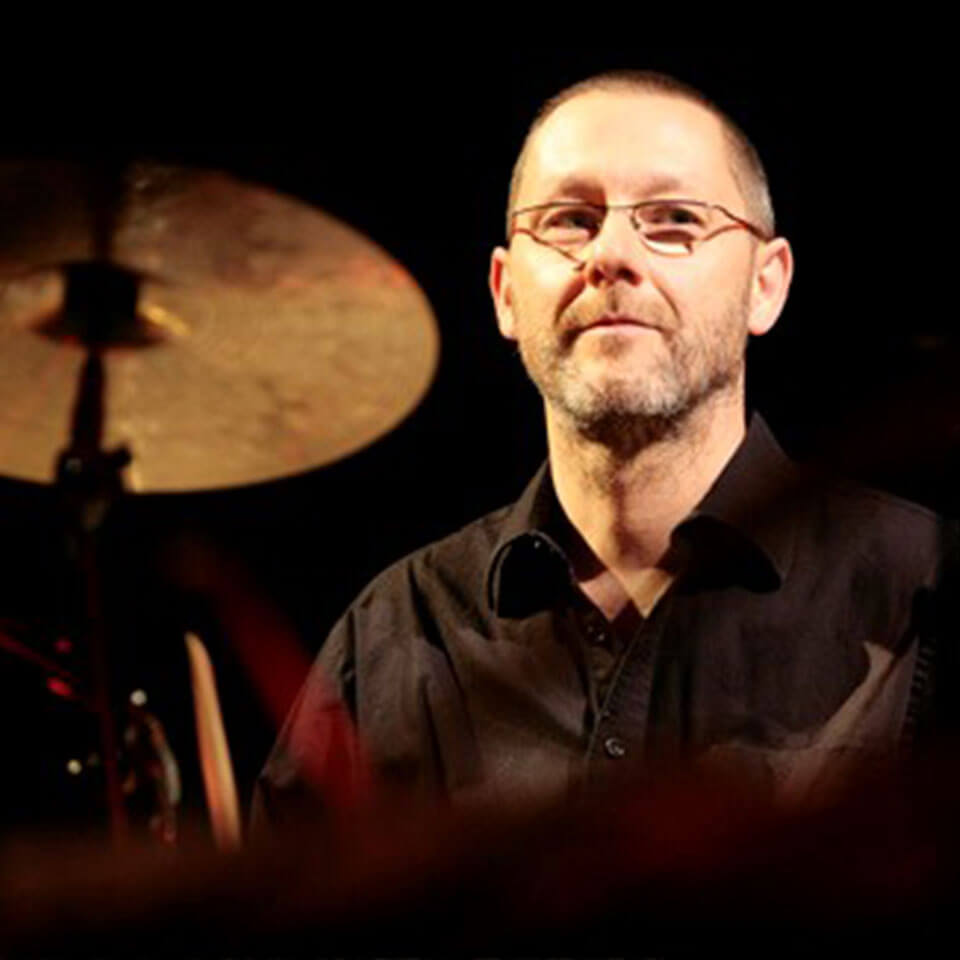
Sascha Gotowtschikow
Percussion
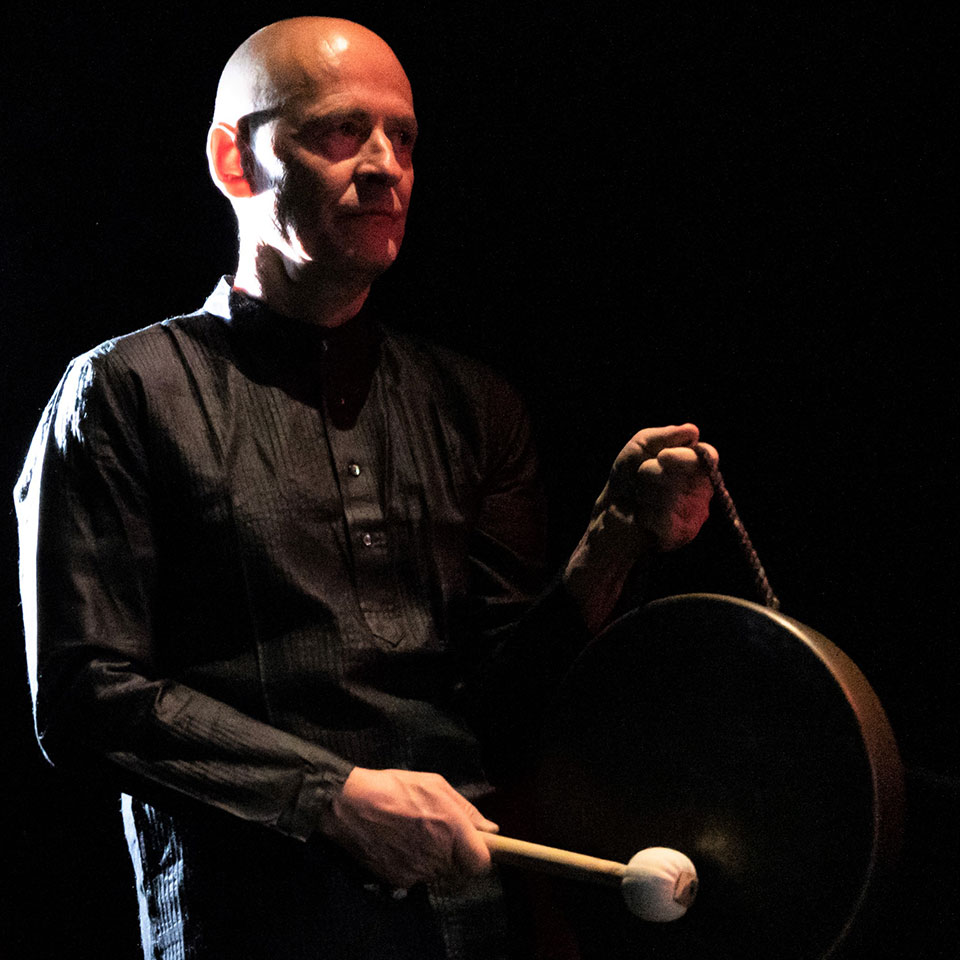
Hans Schanderl
Santur, Cello
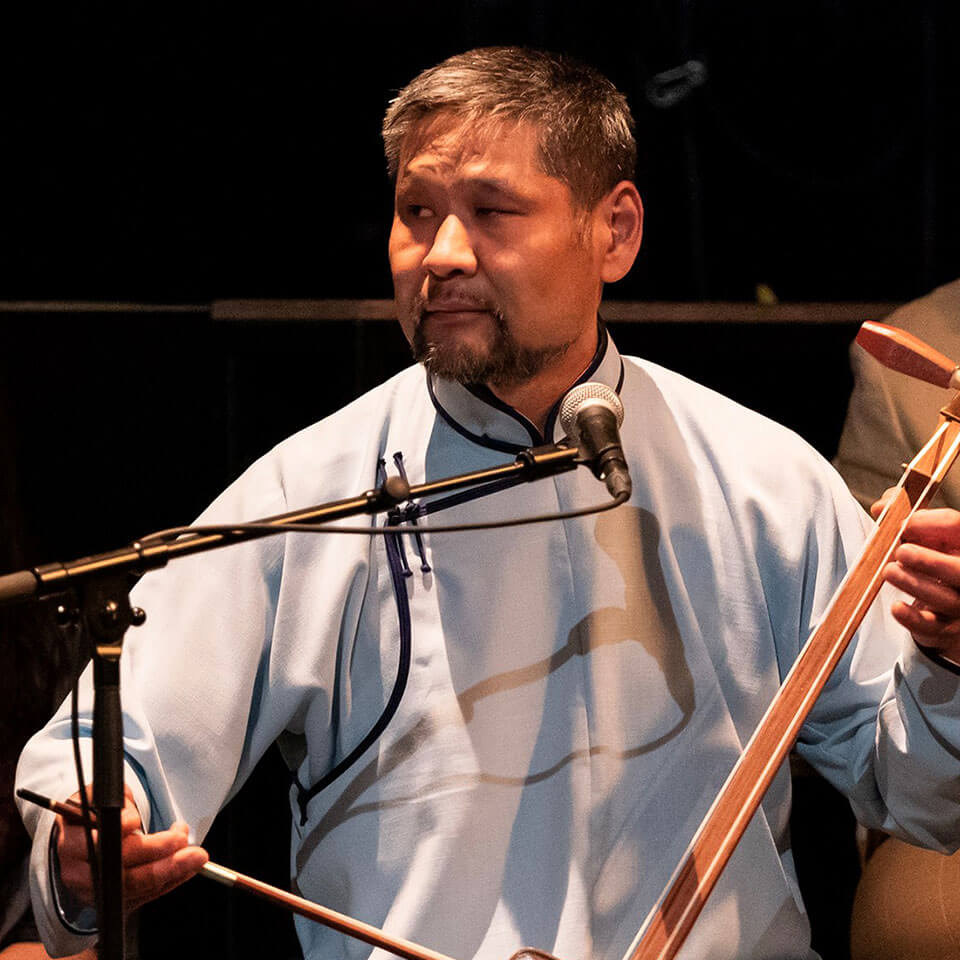
Naranbaatar Purevdorj
Morin Hur, Vocals
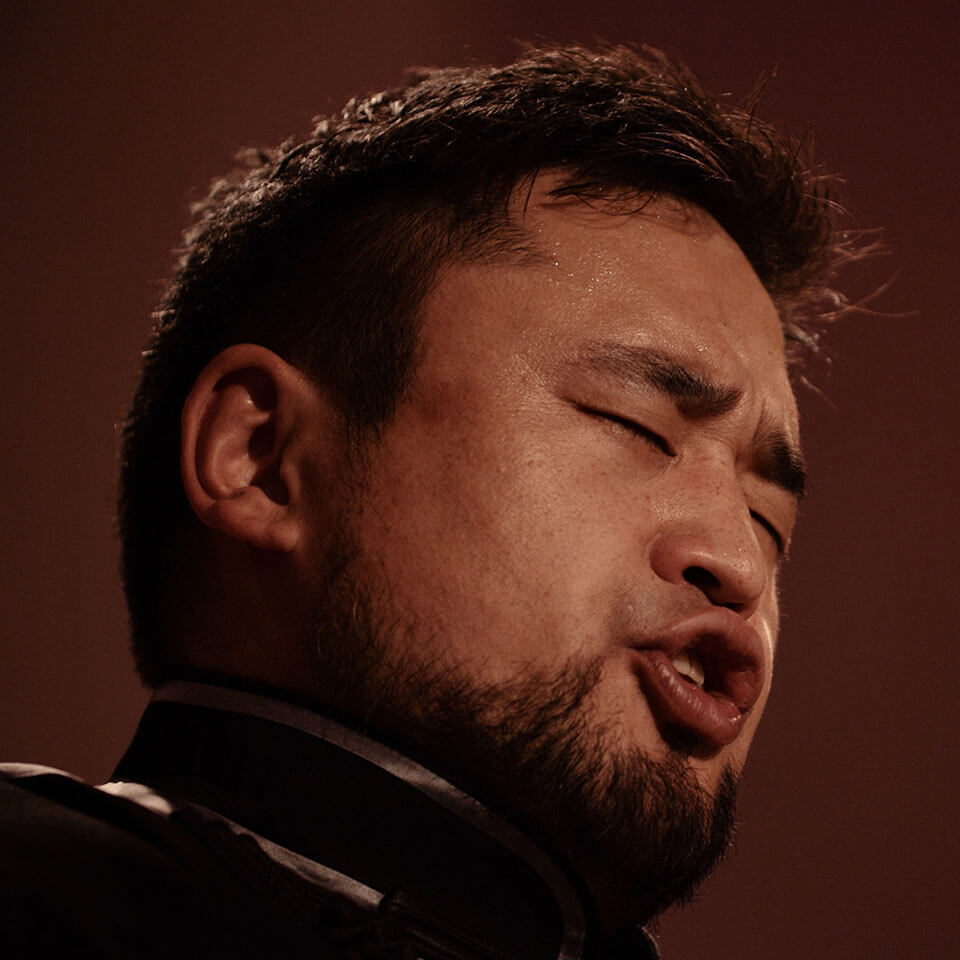
Nasanjargal Ganbold
Morin Hur, Vocals
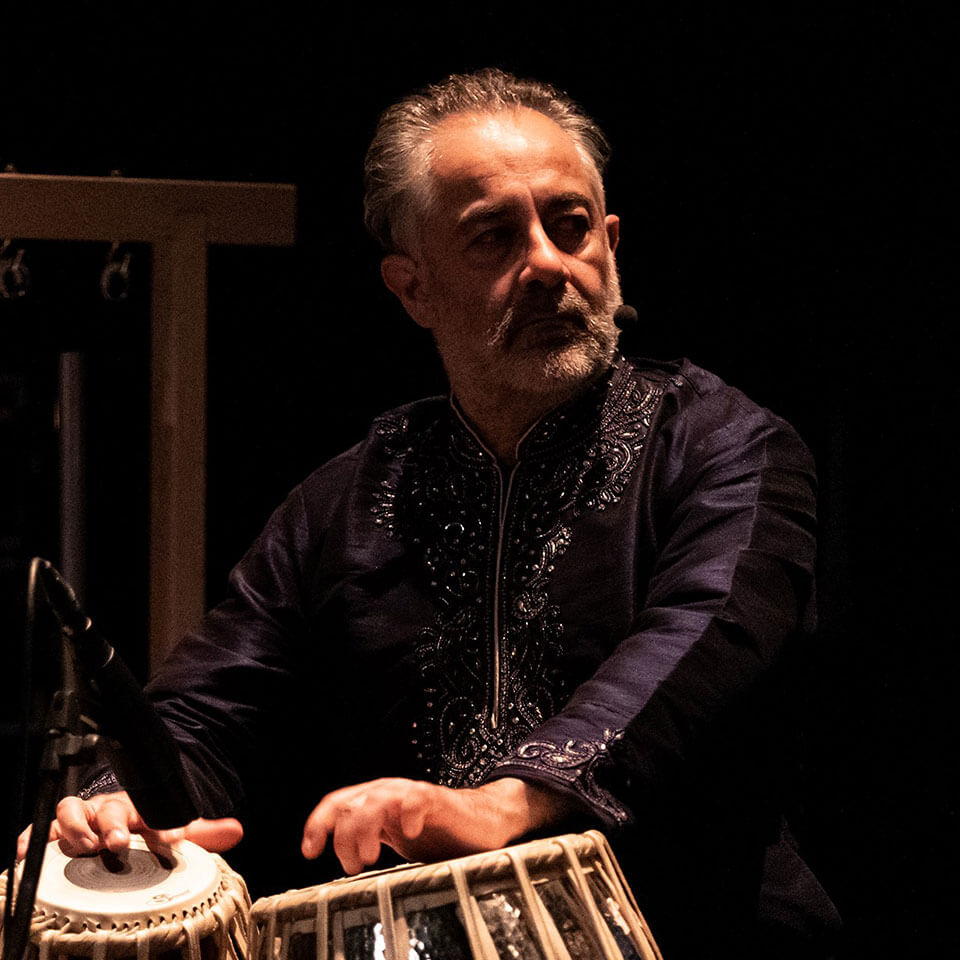
Ravi Srinivasan
Tabla, Vocals
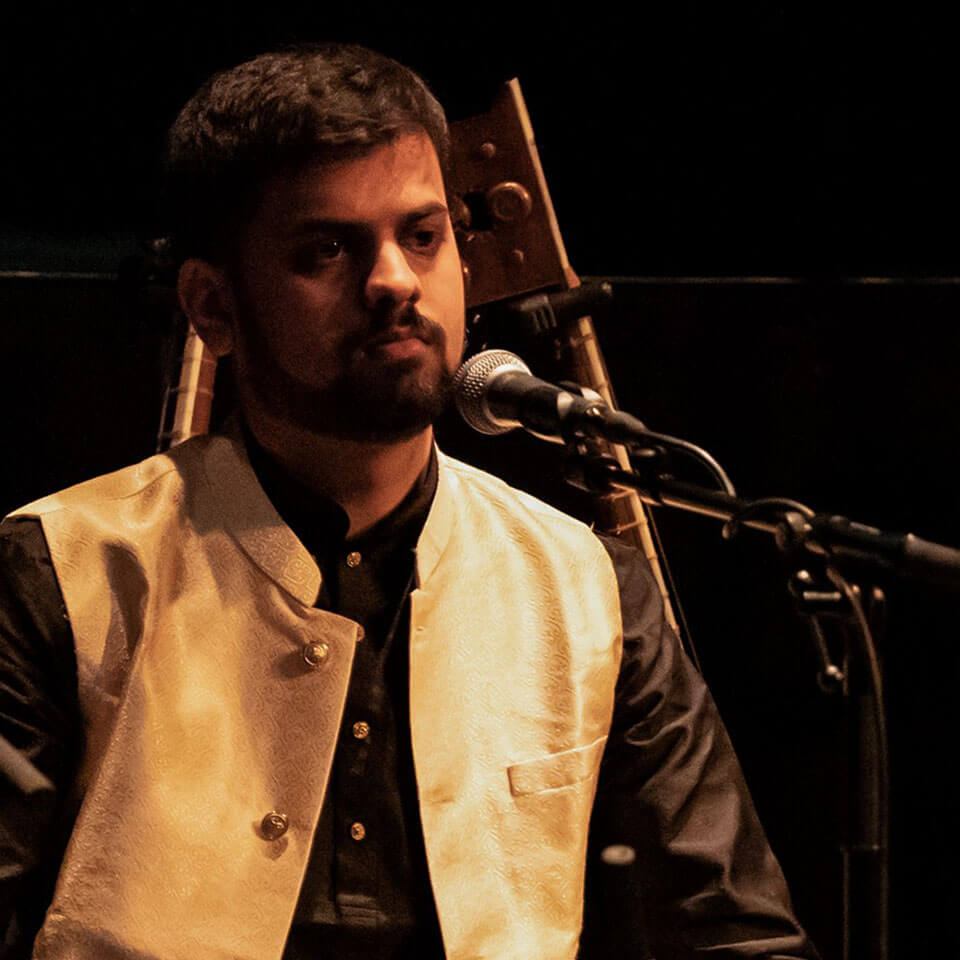
Mohit Karle
Vocals

Saurabh Vartak
Bansuri-Flute
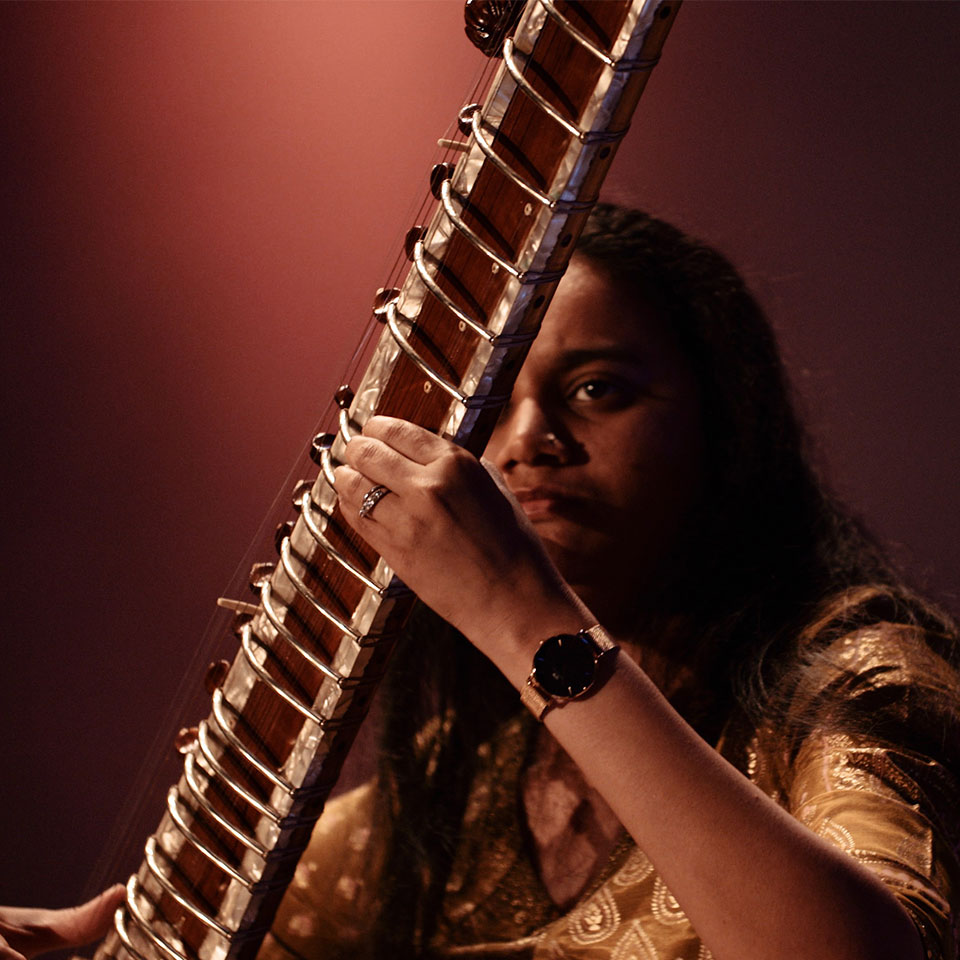
Gauri Deshpande
Sitar
Drama and Dance
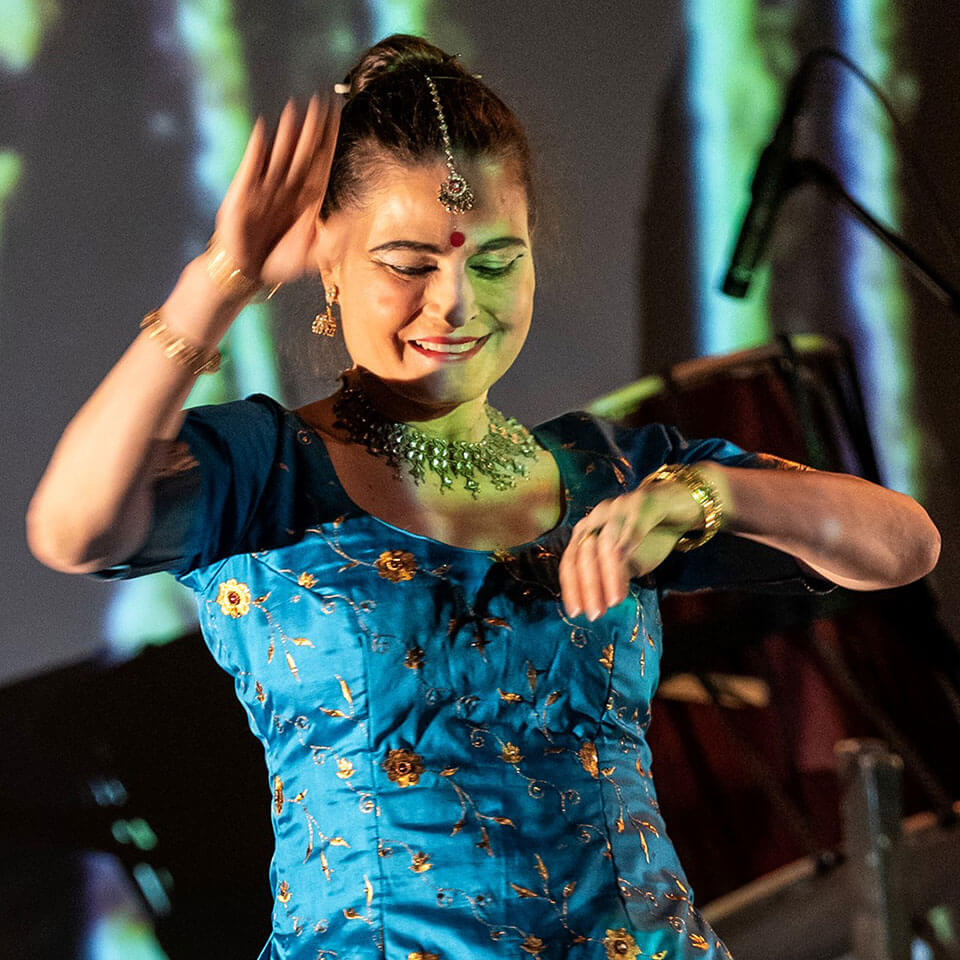
Ioanna Srinivasan
Kathak – Indian Dance
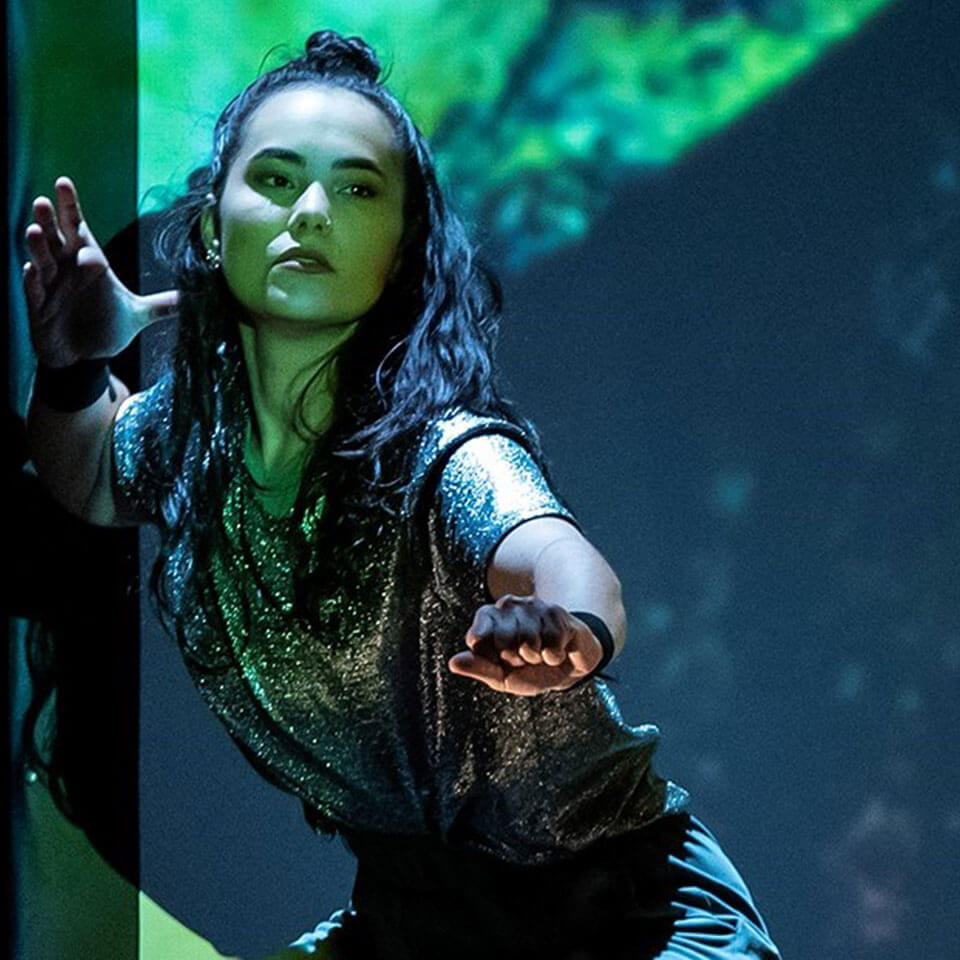
Mirjam Plank
Dance
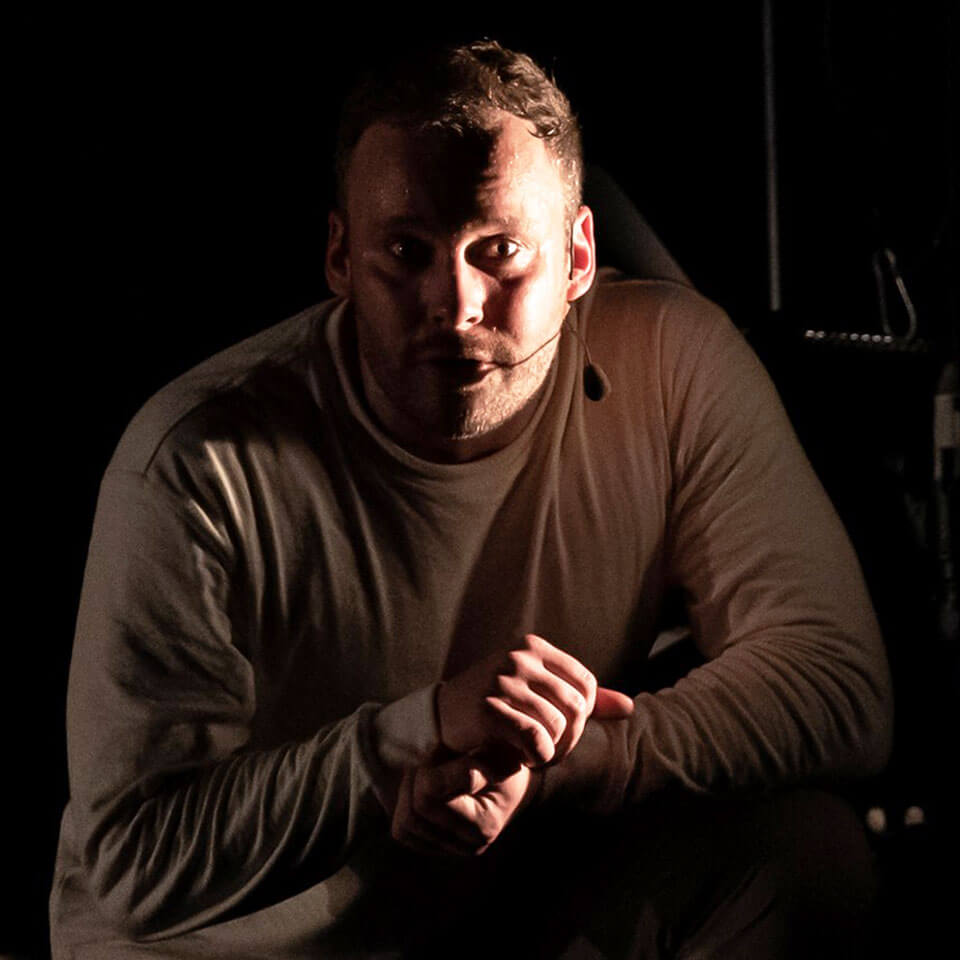
Patrick Nellessen
Drama and Texts
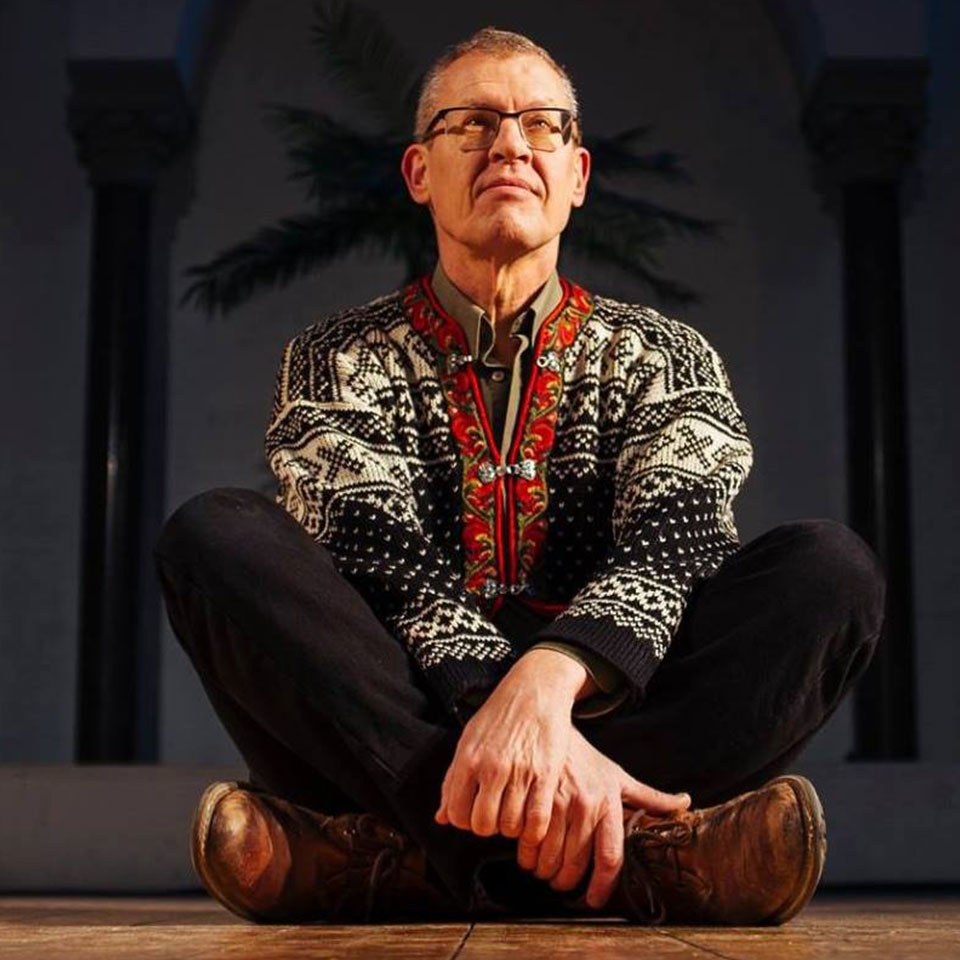
Björn Ross
Scenography

Press Reviews
"The Karma Project celebrates the human voice in all its facets. Thematically, the whole thing is an all-encompassing world theatre with a wide variety of myths; Arjuna, Parzifal and the Indian mystic Kabir join hands." Neue Musikzeitung

